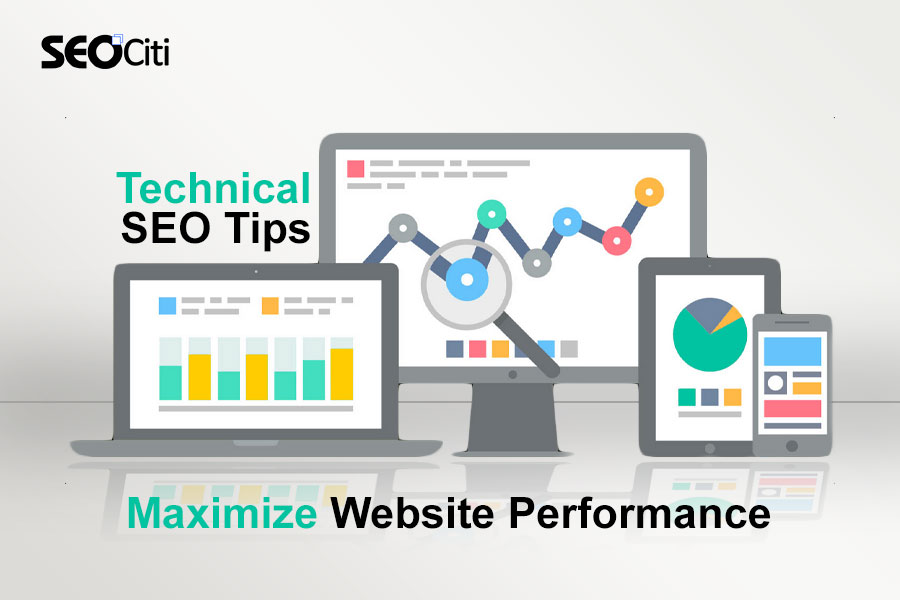
Website performance is critical to your online success. Users expect a fast, efficient and reliable network. Google and other search engines also rank high-performing websites. Here, we will explore expert tips to boost website performance through effective technical SEO strategies.
Technical SEO understanding
Technical SEO is optimizing your website’s infrastructure. This includes backend upgrades to improve search engine crawling and indexing. If you apply optimized technical SEO strategies, it will makes your website faster, easily crawlable, and better indexed to search engines. We can help you boost your website’s performance with our best SEO services for on page, off page and technical SEO.
Why technical SEO is important?
It is important to optimize your website’s performance by applying best technical SEO strategies. Without it, other SEO efforts fall flat. For example, even the best content can fail if your website is slow or has broken links. Companies that offer the best SEO services tend to focus more on technical SEO to ensure the overall health and performance of the website.
Speed efficiency
Website speed matters. Users abandon slow sites immediately. Website speed is the most important ranking factor for google. Here are some tips to boost your site speed.
Suppress HTTP requests: Every element on a page, such as images and scripts, requires an HTTP request. Reducing these requests can significantly speed up your website.
Enable compression: Use Gzip to compress your files. This reduces the file size and speeds up the load time.
Images Optimization: High quality or large images have large file size that can slow your website’s speed. Optimize the images on your website by using image compression tools without losing the image quality and also selecting the correct file format.
Use a content distribution network (CDN): CDNs store your site’s content in multiple locations around the world. This minimizes the distance between the server and the user, speeding up load times.
Server Response Time: Evaluate your hosting services before getting live. Your server response time should be less than 200ms. Choose a reliable hosting provider and make sure your server is properly configured.
Mobile optimization
More and more people are accessing websites on mobile devices, so mobile optimization is important. According to Google, website is ranked on the bases of mobile-first index strategy, which means google primarily uses the mobile version of your website first for ranking. Here’s how to optimize for mobile:
Responsible Design: Make sure your website design is responsible. It can easily adapt to different screen sizes.
Optimize touch: Make sure buttons and links are easy to click on mobile devices. Avoid using flash and other obsolete technology.
Faster delivery times: Mobile users expect faster delivery times. Use the same speed optimization techniques as you would for the desktop version.
Crawlability and Indexing
Search engines go through the process to crawl and index your website so it can be able to show accurate search results to user queries. Here’s how to make sure your site is easy to find and index.
Create an XML sitemap: An XML sitemap helps search engines understand your site structure. Reach out to search engines through their website tools.
Use the Robots.txt file: This file tells search engines which pages to crawl and which to ignore. Make sure it is not configured to block important pages.
Fix Broken Links: A broken link can hurt your site’s crawlability and also affect ranking. You must check and fix the broken links on your website if any.
Use Canonical Tags: These tags prevent secondary context by specifying the desired part of the page. These tags help search engines to understand which pages are specified for indexing.
Data structured
In order to get search engine understand your website’s content, structured data or schema markup helps better. It provides context, which can improve your search and provide nice nuggets of information. Here is how to use it.
Identify Key Content: Identify content that could benefit from lists, such as reviews, products, or notes.
Use Schema Markup: Add appropriate schema markup to your HTML. You can generate schema markup and validate it using Google’s Structured Data Markup tools before applying to your website and simplify this process.
Test your markup: Use Google’s Structured Data Testing Tool to verify that your markup is properly implemented.
Protect your website
Cyber-attacks are common on internet and it is crucial to secure your website and databases. This is most important factor of technical SEO. Google prefers secure websites and uses HTTPS as a ranking signal. Here’s how to secure your site:
- Use HTTPS: Encrypt your site with an SSL certificate. This encrypts the data and provides a secure connection.
- Regular updates: Keep your website software up to date, including plugins and themes, to protect against vulnerabilities.
- Security Monitoring: Regularly check your website for security issues. Use tools like Google Search Console for alerts and insights.
Optimize the URL structure
A clean and organized URL structure makes it easier for search engines to understand and index your website. Here are some tips:
- Use descriptive URLs: Include keywords, and keep your URLs descriptive and meaningless.
- Avoid special characters: Stick to letters, numbers and letters in your URL. Avoid special characters and unnecessary parameters.
- Keep URLs short : Short URLs are easier to read and remember. They are also very efficient on demand.
Leveraging SEO best practices
Implementing technical SEO strategies can be difficult. If you don’t know where to start, consider hiring a professional that offers excellent SEO services. They can monitor your website, identify issues, and effectively implement solutions.
In conclusion, enhancing website usability through technical SEO is essential for online success. You can improve your site’s performance and search engine rankings by focusing on speed, mobile optimization, crawlability, structured data, security, and URL structure. Partnering with the best SEO services for the best results can ensure that your website reaches its full potential.
